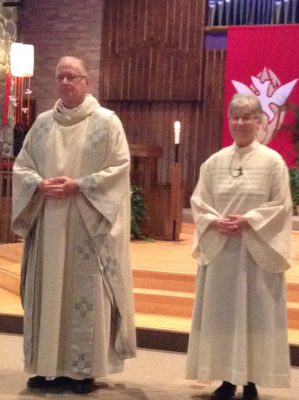The Role of Women
PEP Newsletter
Ideas For Your Parish  _______________________________________________________________________________________ February, 2024
_______________________________________________________________________________________ February, 2024
Recent Comment From Pope Francis
“Pope Francis has drawn attention to the question of the role of women in the Church,” wrote Colleen Dulle in the December 7, 2023 issue of americamagazine.org. She quoted Pope Francis as saying, “The Church is woman, and if we cannot understand what a woman is, what is the theology of women, we will never understand the Church. One of the great sins we have witnessed is ‘masculinizing’ the Church. This is the job I ask of you, please: Demasculinize the Church.’ A statement from the Holy See Press Office said that the pope’s cabinet ‘agreed on the need to listen . . . to the feminine aspect of the Church, so that the processes of reflection and decision-making can benefit from the irreplaceable contribution of women.’”
Colleen Dulle also referred to the final document of the October, 2023 Synod in Rome which stressed that “it was ‘urgent’ for women . . . to assume roles of responsibility in pastoral care and ministry. It called for women to be allowed to be judges in all canonical processes and for future reflection on the female diaconate. . . It recommended creating a special commission to work between the (synod) sessions to explore possible changes to canon law that may be necessary to elevate women to positions of greater authority in the Church, in particular regarding the separation of ecclesial authority from the Sacrament of Holy Orders.”
A Scenario For Inclusion
At the present moment women are very active on the local parish level. They make up the majority of the staff and lay volunteers. The question is, to what extent are they included in shaping the final directions and policy formation of the parish as a whole. Consider, for instance, a new pastor being assigned to a parish. He is wise enough to know that his task for the first six months, in so far as possible, is to lay low and pay attention to how it operates. He pays attention during staff and council meetings to the degree to which people wait to see what he will say and then follow his lead. That had not been his way of pastoring in his previous parish, but he lets it continue to see how it will play out.
An important issue arose which demanded his direct involvement. It had to do with the lower number of people at the weekend liturgies. Although the Covid crisis had largely passed, parishioners were no longer attending the Masses to the extent they once did before the pandemic struck. No amount of new publicity and fresh attention given to re-inviting people back to church seemed to have made a dent in the attendance numbers. It became obvious that a reduction in the number of Sunday liturgies was needed. Although the impetus did not come from the pastor, he was happy when the staff and lay leaders felt a change was necessary. The pastor called a special meeting of the combined council and staff to explore options and decide upon a course of action. Rather than run the meeting himself, he asked the head of the pastoral council, a man, to be the chair. The meeting did not go well because the chair gave more credence to the men than the women. A woman staff member broke in, “Excuse me but may I make a comment? I don’t feel comfortable about how this meeting is proceeding. It seems to me as if my opinion does not carry as much weight as do those of the men in the room.” Many of the women nodded in agreement. At this point the pastor broke in saying, “What an important moment this is. May I suggest we suspend the agenda and focus instead on how we intend to operate as the leadership of this parish. I ask that we break into mixed groups of three, each including at least one woman and one man. Choose a person to act as the observer while the other two discuss what changes might be possible in order to act more as a united group where all feel affirmed and accepted as equal members of the parish leadership.” This they did and it became a turning point for the staff and leaders. These small group discussions uncovered a number of areas where greater acceptance and mutuality could be made, especially for women members, raising the level of awareness where the contributions from women could be better affirmed.


